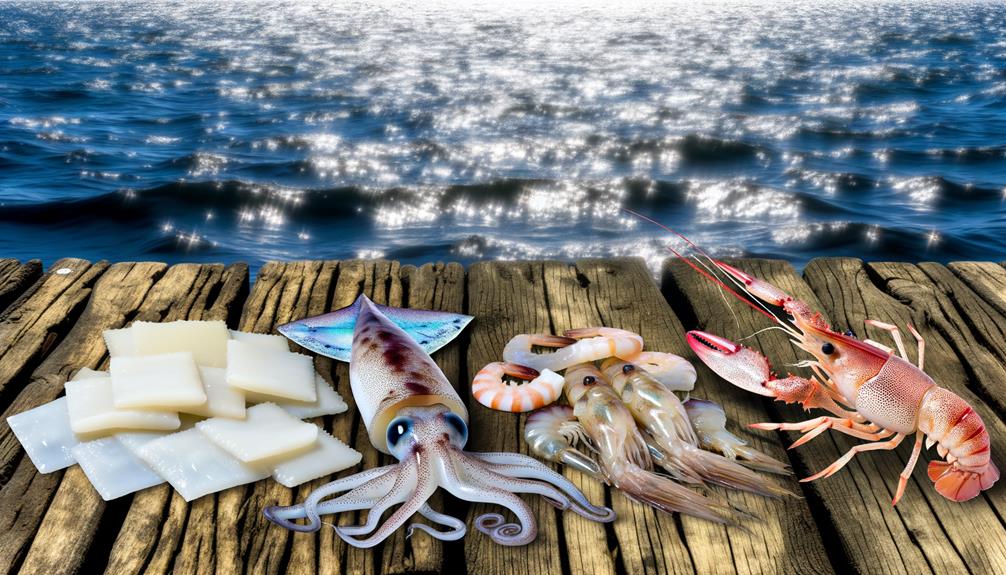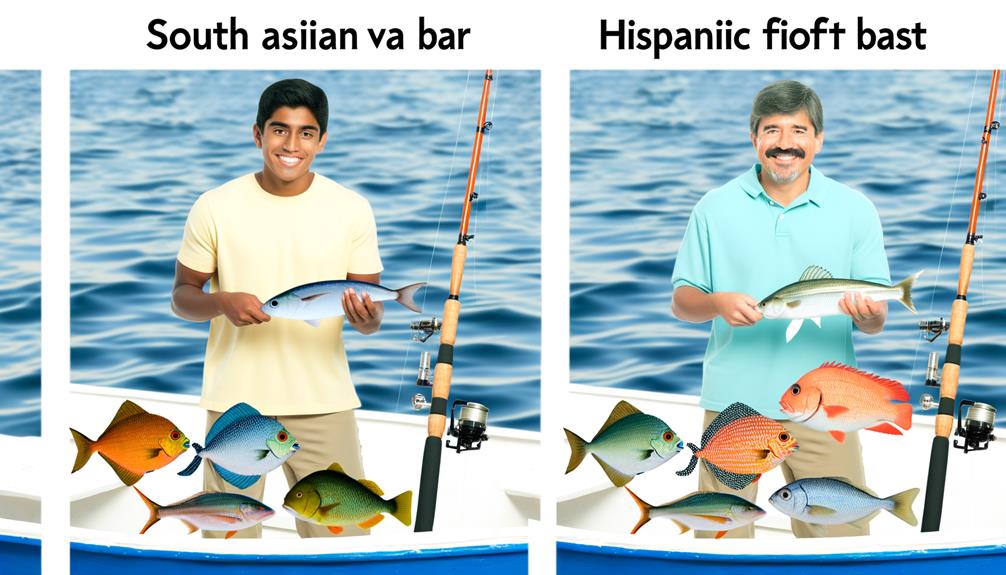In the realm of saltwater fishing, the selection of appropriate bait is an art and science that can dramatically influence your catch. Various options range from shrimp and shellfish to cut bait and bait fish, each offering unique advantages that cater to different species and circumstances.
Whether you're angling for grouper or mahi mahi, understanding the preferences of your target can lead to a more fruitful experience. However, the question remains: what is the most effective bait for saltwater fishing? Your input can help illuminate this intriguing topic further.
Key Takeaways
- Shrimp, shellfish, cut bait, and bait fish are effective saltwater baits, attracting a wide variety of species.
- The choice of bait should align with the target species' natural diet and size to increase catch success.
- Lures like Paddletail Soft Plastic and Gold spoon can be reused and cater to specific fish, offering versatility in saltwater fishing.
- Natural bait and lures have their pros and cons, considering effectiveness, regulations, scent, movement, and reusability.
Understanding Saltwater Bait
In the realm of saltwater fishing, understanding the intricacies of choosing the appropriate bait – be it shrimp, shellfish, cut bait, or bait fish – is pivotal to successfully attracting a wide range of fish species. Shrimp, a versatile and effective live bait, entices fish of all sizes due to its scent and movement. Shellfish, including clams, mussels, and crabs, are particularly appealing to specific types of saltwater fish such as grouper. These baits offer a unique versatility when used for inshore fishing.
Cut bait, derived from slicing up bait fish, emits a potent aroma that attracts diverse saltwater species like sea bass and mahi mahi. Its effectiveness is further amplified when used as saltwater lures. On the other hand, bait fish such as eels and ballyhoo are widely favored for saltwater game fish. Their natural movement and scent drastically enhance their potential for successfully drawing fish.
Understanding these different types of bait and their specific applications in saltwater fishing can significantly improve your fishing experience. It offers the opportunity to foster a sense of belonging amongst fellow anglers, making each fishing adventure rewarding and enjoyable.
Choosing the Right Bait
Building upon the understanding of various bait types, it becomes crucial to take into consideration the process of choosing the right bait, a decision that hinges on several key factors. One of the most important factors is the size of the bait, which should match the size of the target species. This is to ensure the bait is able to entice and not intimidate the predator fish, thereby increasing your chances of a successful catch.
The natural diet of the fish species you're targeting is another vital consideration. For instance, live shrimp serve as an excellent choice of bait for saltwater fishing, given their universal appeal to a wide range of saltwater fish species. However, artificial lures designed to mimic the natural prey of the fish can also be effective.
Additionally, catching your own bait can prove to be a cost-effective alternative to buying bait from a shop. This not only saves money but also allows for a more authentic fishing experience. Remember, the right choice of bait is fundamental to a rewarding saltwater fishing adventure.
Popular Types of Saltwater Baits

Have you ever wondered what types of bait are most effective in enticing a variety of saltwater fish species? The world of saltwater fishing is vast, and the bait used can make a significant difference in your success. Certain baits are more effective for specific saltwater game fish, and understanding these preferences can increase your chances of a successful catch.
Here are some popular types of saltwater baits:
- Shrimp: Known for its versatility, shrimp attracts a wide range of saltwater fish due to its scent and enticing movement.
- Shellfish: Clams, mussels, and crabs are savored by fish like grouper and provide diverse bait options.
- Cut bait: Made by cutting up bait fish, this emits a potent aroma that lures species like sea bass, mahi mahi, and bluefish.
- Bait fish: Eels, ballyhoo, and pilchards are popular for catching saltwater game fish, thanks to their natural movement and scent.
Though lures, including topwater lures, are also widely used, these natural baits often provide a real and irresistible meal for the fish. Whether you prefer using shrimp, shellfish, cut bait, or bait fish, each has its unique advantages in saltwater fishing.
Seven Essential Saltwater Fishing Lures
As we progress in our exploration of saltwater fishing, we now turn our focus to the seven essential lures that are indispensable for any angler.
These lures, from the versatile Paddletail Soft Plastic to the classic White Bucktail jigs, offer reliable alternatives to natural bait, significantly boosting your chances of a successful catch.
Each lure presents unique properties, tailored to attract a wide range of saltwater species under various fishing scenarios.
Top Artificial Lures
Every angler's tackle box should be equipped with these seven essential artificial lures for saltwater fishing, each boasting unique characteristics and proven effectiveness in attracting a variety of marine species. The first subset of these indispensable lures includes soft plastics, such as the versatile paddletail soft plastic that can captivate predatory fish at various depths.
- The gold spoon lure, with its assortment of shapes and colors, appeals to a broad range of saltwater species.
- Power prawn, an artificial shrimp lure, is adaptable and irresistible to most saltwater game fish.
- The classic white bucktail jig proves successful in catching snook, redfish, and speckled trout.
- Topwater lures, like the thrilling Salt Strong Moonwalker and Heddon Zara Spook, add excitement to any saltwater fishing expedition.
Natural Bait Alternatives
While artificial lures certainly hold their own, nothing can truly replicate the allure of seven quintessential natural baits that are particularly effective for saltwater fishing.
One such natural bait is the paddletail soft plastic, a versatile lure that attracts predatory fish at various depths.
Another staple in any angler's tackle box are gold spoons, these shimmering lures draw in a multitude of saltwater species.
The Power Prawn, an artificial shrimp lure, is a potent imitation of a favored prey of many saltwater game fish.
White bucktail jigs excel in snaring species like redfish and speckled trout, while topwater lures provide thrilling surface action for enthusiastic anglers.
These natural bait alternatives offer a rich and rewarding fishing experience.
Hard Vs Soft Bait: What Works?

In the vast and diverse world of saltwater fishing, the choice between hard and soft baits often hinges on several factors including fishing conditions, the target species, and the angler's personal inclination. Hard baits, typically constructed from materials like wood or plastic, are designed to mimic prey fish. They can be particularly effective for targeting predatory species such as bass, pike, and muskie.
On the other hand, soft baits are usually crafted from rubber or silicone. They convincingly imitate natural prey like worms, shrimp, or baitfish due to their lifelike feel and movement in water. This makes them attractive to a wider range of fish species.
Understanding the difference and knowing when to use each bait can enhance your fishing experience. Here are some key points to consider:
- Hard baits are more durable and can withstand aggressive strikes from predatory fish
- Soft baits, due to their flexible nature, create a more realistic motion in the water
- Fishing conditions like water temperature and clarity can influence the effectiveness of hard or soft baits
- The choice between hard and soft baits may also come down to personal preference and experience level.
The Bait Vs Lure Debate
Building on the previous discussion of hard and soft baits, another hotly contested subject within the realm of saltwater fishing is the debate between using natural bait or artificial lures. This debate often revolves around key factors such as scent, movement, the ability to mimic natural prey, and regulations.
Natural bait, like shrimp, is favoured by some anglers for its authentic scent and movement. Its ability to attract a wider range of fish species makes it an ideal choice for novice anglers seeking higher success rates. On the other hand, artificial lures, with their reusability and versatility, are preferred by experienced anglers. Lures offer different actions that can mimic natural prey, providing a variety of options for different fishing scenarios.
Regulations and ethics also play a pivotal role in this debate. Considerations like barbless hooks and size limits are critical in influencing the choice between bait and lures. Here's a comparative overview:
| Natural Bait | Artificial Lures | |
|---|---|---|
| Scent | High | Low |
| Movement | Natural | Mimicked |
| Species | Broad range | Specific |
| Ethics | Varies | Generally accepted |
| Regulations | Subject to restrictions | Fewer restrictions |
This summary should guide you towards making an informed decision in the bait vs lure debate.
Frequently Asked Questions
How Do You Lure Fish in Saltwater?
To effectively lure fish in saltwater, consider factors like saltwater lure types, underwater visibility, seasonal bait preferences, and fish species specificity. Techniques may include bait preservation methods and night fishing tactics for optimal results.
What Is the Easiest Way to Catch Saltwater Fish?
The easiest way to catch saltwater fish involves selecting appropriate rods, understanding the importance of timing tides, choosing between boat and shore, knowing fish species and seasons, and using proper tackle.
What Bait Attracts the Most Fish?
Bait preferences vary greatly among fish species, influenced by seasonal patterns and water temperature. Optimal bait often mimics a fish's natural prey, though artificial lures can also be effective based on these variables.
Can You Use Worms for Saltwater Fishing?
While worms can be used for saltwater fishing, their suitability varies by species. Worm availability in saltwater environments is less common, and they may not be as effective as artificial baits or other live baits.
Conclusion
In conclusion, the efficacy of different types of saltwater bait requires careful consideration. Shrimp, shellfish, cut bait, and bait fish each offer unique advantages, enticing a range of game fish species. Yet, the lure versus bait debate persists. Is it possible that the best choice depends on the particular conditions and target species?
Undeniably, further research and practical experience are invaluable in making informed decisions, ensuring a rewarding saltwater fishing experience.
